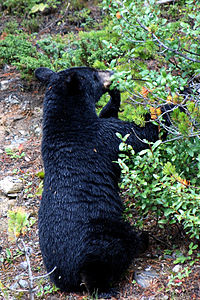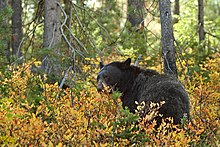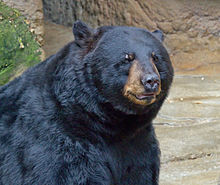The American black bear (Ursus americanus), also called simply black bear or sometimes baribal, is a medium-sized bear endemic to North America. It is the continent’s smallest and most widely distributed bear species. American black bears are omnivores, with their diets varying greatly depending on season and location. They typically live in largely forested areas, but will leave forests in search of food, and are sometimes attracted to human communities due to the immediate availability of food.

The International Union for Conservation of Nature (IUCN) lists the American black bear as a least-concern species, due to its widespread distribution and a large population estimated to be twice that of all other bear species combined. Along with the brown bear (Ursus arctos), it is one of only two modern bear species not considered by the IUCN to be globally threatened with extinction.

Despite living in North America, American black bears are not closely related to brown bears and polar bears; genetic studies reveal that they split from a common ancestor 5.05 million years ago. American and Asian black bears are considered sister taxa and are more closely related to each other than to the other modern species of bears. According to recent studies, the sun bear is also a relatively recent split from this lineage.

